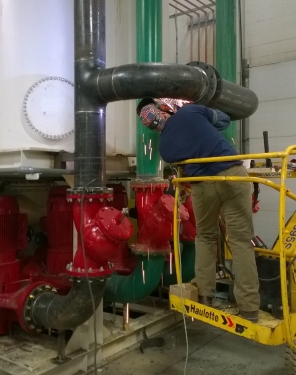
<comprehensive_research_planning>The pipefitting trade is experiencing significant growth in Columbus, Georgia, offering promising career opportunities for skilled professionals. With an average hourly wage of $23.94 1 and union pipefitters earning up to $35.07, the field presents competitive compensation compared to other trades 2. As of early 2025, there were 10-20 active pipefitter positions advertised on platforms like Indeed, with over 220 openings across the state 13, indicating strong local demand. The industry is supported by major local employers like Pratt & Whitney and AFB International, both of which announced significant expansions recently, increasing the need for skilled pipefitters 4. Additionally, the housing sector, which accounts for 11% of local jobs, drives consistent plumbing and infrastructure development 4. With projected national growth of 6% for plumbers, pipefitters, and steamfitters through 2033 3, Columbus' industrial expansion positions the city for comparable or even stronger job market growth.</comprehensive_research_planning>

Before pursuing a career in pipefitting, it’s important to understand the responsibilities and scope of work. Pipefitters install, maintain, and repair piping systems that carry liquids and gases in industrial, commercial, and residential settings 5. Their work is critical in sectors like HVAC, refrigeration, fire suppression, and energy manufacturing 1. Unlike general plumbers, pipefitters often work with high-pressure, specialized piping systems, including those used in chemical plants, power stations, and manufacturing facilities 1.
Key responsibilities of a pipefitter include:
Given the technical nature of the work and the use of specialized tools, pipefitters must have strong mechanical aptitude, physical endurance, and attention to detail. Safety is also a critical component, which is why OSHA 30 certification is increasingly recommended in the industry 5.
In Columbus, GA, becoming a pipefitter does not require a specific licensing mandate from the state of Georgia. However, there are important qualifications and certifications that can significantly enhance employment opportunities 5.
Primary requirements to work as a pipefitter in Columbus, GA include:
While there is no mandatory state licensing exam for pipefitters in Georgia, industry-standard credentials such as those from the United Association (UA) Local Union can increase career mobility and earning potential 4.
One of the most effective pathways to becoming a certified pipefitter is through a formal apprenticeship program. These programs typically take between 4 to 5 years to complete, with thousands of hours of on-the-job training combined with classroom instruction 2.

Columbus Technical College
Local Job Boards and Industry Organizations
Before starting a pipefitting apprenticeship or career path in Columbus, GA, applicants should meet the following requirements:
While not always mandatory, enrolling in a formal pipefitting course can provide a foundational knowledge base before beginning an apprenticeship. Training programs at institutions like Columbus Technical College or industry-specific courses can cover:
Some programs offer pre-apprenticeship certifications that help applicants secure apprenticeship positions 1.
An apprenticeship is the most common way to become a fully qualified pipefitter in Georgia. During this time, apprentices work under experienced journeyman pipefitters while completing related classroom instruction. Most programs include:
During your apprenticeship, you'll have the opportunity to gain real-world experience in various pipefitting applications, including HVAC, refrigeration, and industrial systems 2.
To find an apprenticeship:
While Georgia does not require a journeyman license for pipefitters, earning certification through organizations like the United Association (UA) or completing an OSHA certification program can significantly increase job opportunities and earning potential 2.
Journeyman pipefitters are typically eligible to work independently and supervise apprentices, making this step valuable for career advancement 5.
For those looking to further their careers, specialized training in specific types of piping systems (e.g., high-pressure systems, pharmaceutical-grade piping, or HVAC refrigeration) can open doors to higher-paying positions. Additionally, earning additional welding certifications or soldering credentials can enhance a pipefitter’s marketability 5.
Pipefitting in Columbus, GA, presents a stable and financially rewarding career path. As of early 2025:
These figures compare favorably with related trades such as plumbers and HVAC technicians, particularly for union members or those with advanced certifications 2.
| Factor | Columbus, GA | Georgia State Average |
|---|---|---|
| Average Hourly Rate | $23.94 1 | $24.18 3 |
| Union Pipefitter Average | $25.64 2 | N/A |
| Top Earners | $35.07 2 | N/A |
| Job Growth Projection | Aligns with or exceeds national average 4 | 6% growth by 2033 3 |
As with many skilled trades, pipefitting is evolving due to technological advancements and shifting industry demands. For pipefitters in Columbus, GA, staying ahead of these trends can significantly enhance career prospects.
By staying informed and adaptable to these industry shifts, Columbus-based pipefitters can position themselves for long-term career growth and increased earning potential.
Starting a career in pipefitting in Columbus, GA offers a stable and financially rewarding path for those with technical aptitude and a strong work ethic. With hourly wages averaging $23.94 and union pipefitters earning up to $35.07, the trade is both competitive and in demand 12. As local industries continue to grow — from industrial expansions at Pratt & Whitney and AFB International to ongoing residential and commercial construction — the need for skilled pipefitters will remain strong through 2025 and beyond 4.

To begin your journey:
Meet the basic requirements: Be at least 18 years old and have a high school diploma or GED 5.
Pursue a trade program or pre-apprenticeship training to build foundational skills 1.
Apply for an apprenticeship through local unions or via online job boards. You can start by searching for current openings on Gild.
Complete your apprenticeship, gaining thousands of hours of hands-on experience and classroom instruction 4.
Consider certification or union membership to increase job opportunities and earning potential 2.
https://www.indeed.com/q-pipefitter-l-columbus,-ga-jobs.html ↩ ↩2 ↩3 ↩4 ↩5 ↩6 ↩7 ↩8 ↩9 ↩10 ↩11
https://www.indeed.com/q-pipe-fitting-l-columbus,-ga-jobs.html ↩ ↩2 ↩3 ↩4 ↩5 ↩6 ↩7 ↩8 ↩9 ↩10 ↩11 ↩12
https://www.ziprecruiter.com/Jobs/Pipefitter/-in-Columbus,GA ↩ ↩2 ↩3 ↩4 ↩5 ↩6 ↩7 ↩8 ↩9
https://www.roadtechs.com/search/search.php?search3=t1080 ↩ ↩2 ↩3 ↩4 ↩5 ↩6 ↩7 ↩8 ↩9 ↩10
https://www.fortis.edu/blog/skilled-trades/how-to-become-a-pipefitter.html ↩ ↩2 ↩3 ↩4 ↩5 ↩6 ↩7 ↩8 ↩9 ↩10 ↩11 ↩12 ↩13

